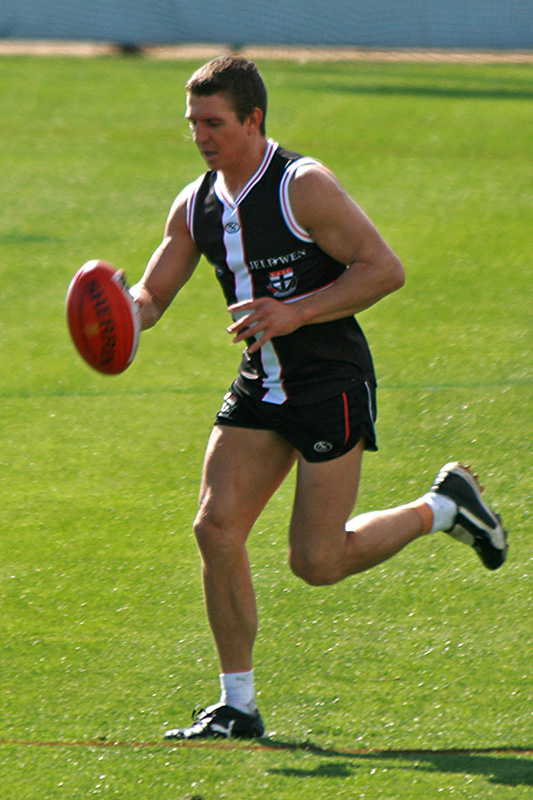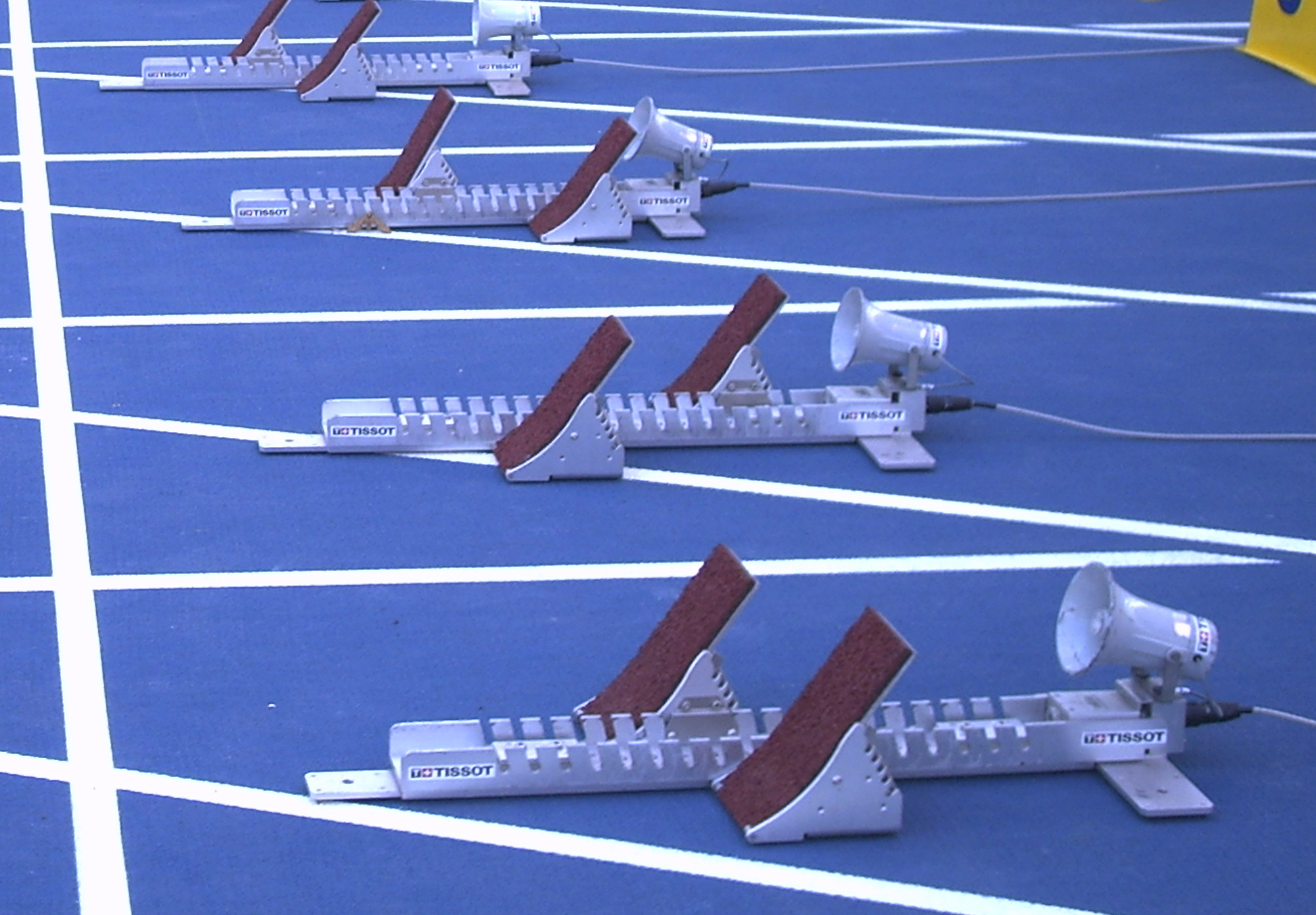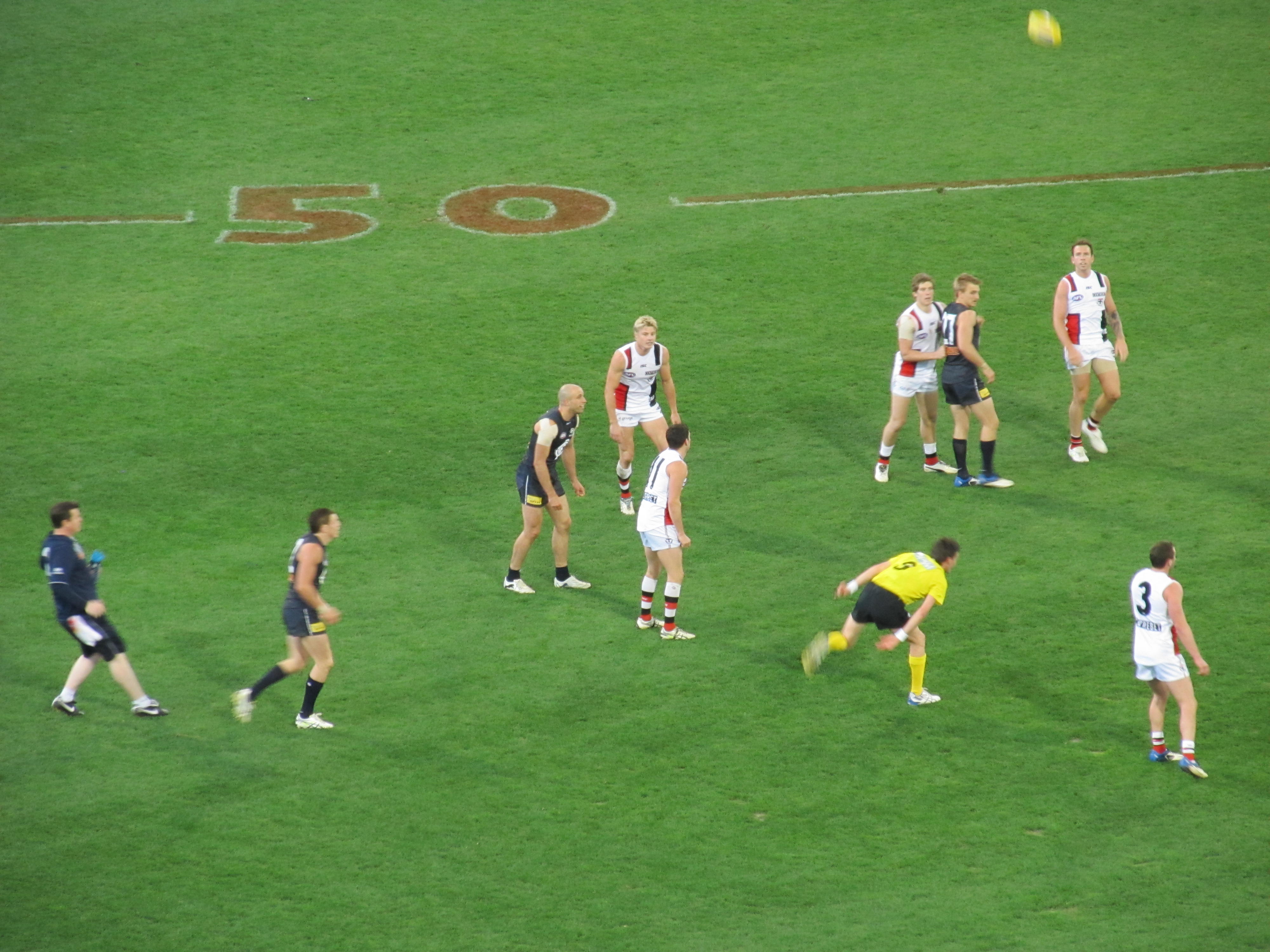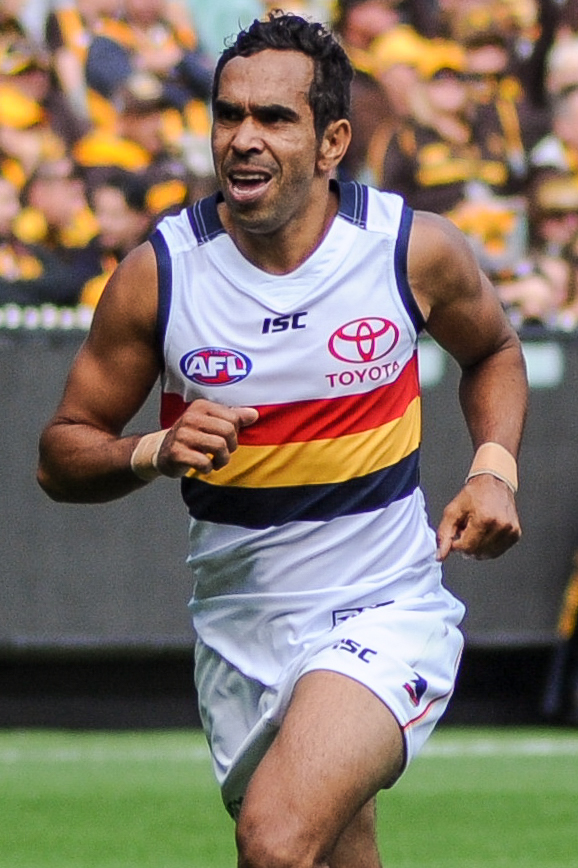|
Running Bounce
A running bounce, or simply bounce, is a skill in the sport of Australian rules football (necessitated by the Laws of the Game) and some variants where a player, bounces (or touches) the ball on the ground in order to run more than the maximum distance with the ball (currently 15 metres/16 yards/50 feet in most competitions). The earliest record of the running bounce is its use by the Geelong Football Club in 1862, as a means of slowing down the player in possession of the ball and to create more opportunities for a turn over. It became an official part of the Laws of the Game in 1866. The bounce is regarded as a distinctive feature, and one of the most difficult skills to master, of the sport. Observers sometimes compare it to dribbling in basketball which appeared in the 1890s and bouncing or soloing in Gaelic games (introduced to Gaelic football in the 20th century). The feature of the game led to the sport early on being referred to as "bouncing football" in some places in t ... [...More Info...] [...Related Items...] OR: [Wikipedia] [Google] [Baidu] |
Australian Rules Football
Australian football, also called Australian rules football or Aussie rules, or more simply football or footy, is a contact sport played between two teams of 18 players on an oval field, often a modified cricket ground. Points are scored by kicking the oval ball between the central goal posts (worth six points), or between a central and outer post (worth one point, otherwise known as a "behind"). During general play, players may position themselves anywhere on the field and use any part of their bodies to move the ball. The primary methods are kicking, handballing and running with the ball. There are rules on how the ball can be handled; for example, players running with the ball must intermittently bounce or touch it on the ground. Throwing the ball is not allowed, and players must not get caught holding the ball. A distinctive feature of the game is the mark, where players anywhere on the field who catch the ball from a kick (with specific conditions) are awarded unimped ... [...More Info...] [...Related Items...] OR: [Wikipedia] [Google] [Baidu] |
False Start
In sports, a false start is a disallowed start, usually due to a movement by a participant before (or in some cases after) being signaled or otherwise permitted by the rules to start. Depending on the sport and the event, a false start can result in a penalty against the athlete's or team's field position, a warning that a subsequent false start will result in disqualification, or immediate disqualification of the athlete from further competition. False starts are common in racing sports (such as swimming, track, sprinting, and motor sports), where differences are made by fractions of a second and where anxiety to get the best start plays a role in the athletes' behavior. A race that is started without a false start is referred to as a ''fair start'' or ''clean start''. In sports Association Football (soccer) Football games cannot be restarted unless certain conditions are met. For example, both teams need to be in their own half of the field for the start of the game or res ... [...More Info...] [...Related Items...] OR: [Wikipedia] [Google] [Baidu] |
Ball-up
A ball-up (pl. ball-ups) in Australian rules football is the method by which the field umpire restarts play at a neutral contest after a stoppage within the field of play. It involves the throwing or bouncing of the ball up between two players, known as rucks, who then attempt to win possession for their teams. A related type of contest, the boundary throw-in, occurs to restart play after the ball has gone out of bounds. It is governed by similar rules, although is not itself known as a ball-up. Ball-ups have been part of the Laws of the Game since 1872. Ball-ups are the equivalent of a jump ball, faceoff or dropped-ball from other team sports. Execution There are two means of executing a ball-up: a throw or a bounce. For a throw, the field umpire throws the ball vertically upwards. For a bounce, the umpire throws the ball firmly on the ground such that it bounces several metres up into the air approximately, although not always perfectly, vertically. In both cases, the b ... [...More Info...] [...Related Items...] OR: [Wikipedia] [Google] [Baidu] |
Hurling
Hurling ( ga, iománaíocht, ') is an outdoor team game of ancient Gaelic Irish origin, played by men. One of Ireland's native Gaelic games, it shares a number of features with Gaelic football, such as the field and goals, the number of players and much terminology. The same game played by women is called camogie ('), which shares a common Gaelic root. The objective of the game is for players to use an ash wood stick called a hurley (in Irish a ', pronounced or ) to hit a small ball called a ' between the opponent's goalposts either over the crossbar for one point or under the crossbar into a net guarded by a goalkeeper for three points. The ' can be caught in the hand and carried for not more than four steps, struck in the air or struck on the ground with the hurley. It can be kicked, or slapped with an open hand (the hand pass), for short-range passing. A player who wants to carry the ball for more than four steps has to bounce or balance the ' on the end of the stick ... [...More Info...] [...Related Items...] OR: [Wikipedia] [Google] [Baidu] |
Dribbling
In sports, dribbling is maneuvering a ball by one player while moving in a given direction, avoiding defenders' attempts to intercept the ball. A successful dribble will bring the ball past defenders legally and create opportunities to score. Association football In association football, a dribble is one of the most difficult ball skills to master and one of the most useful attacking moves. In typical game play, players attempt to propel the ball toward their opponents' goal through individual control of the ball, such as by dribbling (the usage of technical maneuvers). In order to go past an opponent, dribbling can involve a wide variety of manipulative tricks and feints; Ronaldinho would often employ elaborate skills and feints, such as the '' elastico'', in order to beat defenders. Dribbling is often invaluable especially in the third part of a pitch or at the wings, where most attacks take place. Dribbling creates space in tight situations where the dribbler is marked (cl ... [...More Info...] [...Related Items...] OR: [Wikipedia] [Google] [Baidu] |
Heath Shaw
Heath Shaw (born 27 November 1985) is a former Australian rules footballer who played for the Collingwood Football Club and the Greater Western Sydney Giants in the Australian Football League (AFL). Heath grew up in Diamond Creek and played junior sport for Diamond Creek Football Club and Diamond Creek Cricket Club. AFL career After being drafted under the father–son rule in the 2003 AFL Draft at pick 48 to , Shaw made his AFL debut in 2005 against St Kilda at the Telstra Dome. He was a solid contributor since making his debut, with his best game being his first. A running defender, Heath has pace and good ball skills which can make him into a good footballer. He played all possible remaining 6 games of the season and kicked his first goal against Adelaide in Round 21. Collingwood (2006–2013) Shaw had a stunning 2006 season, being quickly noted for his ball-winning ability out of the back-line and his consistency and reliability which was a key to the success of the M ... [...More Info...] [...Related Items...] OR: [Wikipedia] [Google] [Baidu] |
Nathan Bock
Nathan Bock (born 20 March 1983) is a former Australian rules footballer in the Australian Football League (AFL). He played for the Adelaide Football Club between 2002 and 2010, and joined the new Gold Coast Football Club in 2011. Adelaide career Bock was elevated off the Adelaide Football Club's rookie list at the start of the 2003 season after being drafted with selection 25 in the 2002 Rookie Draft from Woodville-West Torrens in the South Australian National Football League (SANFL). Debuting with the Adelaide Football Club in 2004 as a 21-year-old, he did well in Adelaide's forward line. On his debut (Round 5 April 23, 2004) he goaled with each of his first two kicks, and he had 94 disposals and kicked 8 goals in his first ten games. Since then, under the coaching of Neil Craig, he has been transformed into a tough centre half-back. Bock missed the first 7 rounds of the 2005 season, but returned in round 8 and showed signs that he and All-Australian defender Ben Rutten wo ... [...More Info...] [...Related Items...] OR: [Wikipedia] [Google] [Baidu] |
Goal Of The Year (AFL)
The Goal of the Year is a competition for the best Goal (sport), goal kick (football), kicked in the Australian Football League (AFL) during that season. It is run in conjunction with the Mark of the Year competition and is currently sponsored by Rebel Sport. The winner is awarded the Phil Manassa Medal. The concept of awards for the goal and mark of the year is thought to have been initiated in 1970, as an unofficial award given by the media to Alex Jesaulenko following his famous mark (Australian football), mark in that season's grand final. The official awards were first given in 2001. Eddie Betts has been awarded Goal of the Year on an unparalleled four occasions (2006, 2015, 2016 and 2019), the most of any player, and is the only player to win the award in consecutive seasons. Selection process Each week, three of the best goals of the round (including the finals) are selected as nominees. A panel of AFL selectors choose the winning Goal (sport), goal of the round. For t ... [...More Info...] [...Related Items...] OR: [Wikipedia] [Google] [Baidu] |
Australian Football League
The Australian Football League (AFL) is the only fully professional competition of Australian rules football. Through the AFL Commission, the AFL also serves as the sport's governing body and is responsible for controlling the laws of the game. Originally known as the Victorian Football League (VFL), it was founded in 1896 as a breakaway competition from the Victorian Football Association (VFA), with its inaugural season commencing the following year. The VFL, aiming to become a national competition, began expanding beyond Victoria to other Australian states in the 1980s, and changed its name to the AFL in 1990. The league currently consists of 18 teams spread over five of Australia's six states (Tasmania being the exception). Matches have been played in all states, plus the Australian Capital Territory and the Northern Territory, as well as in New Zealand and China to expand the league's audience. The AFL season currently consists of a 23-round regular (or "home-and-away") s ... [...More Info...] [...Related Items...] OR: [Wikipedia] [Google] [Baidu] |
Mick McGuane
Michael McGuane (born 29 December 1967) is a former Australian rules footballer who represented and in the Australian Football League (AFL) during the 1980s and 1990s. Playing career Early years (1987–1990) McGuane showed great promise for his local club Sebastopol in the Ballarat Football League. He made his senior debut for the club in 1985 while still a teenager and was a member of the side that lost heavily in the Grand Final to North Ballarat. Ignored by , who had the Ballarat region in their recruiting zone, were quick to pounce, and signed McGuane to their Under 19s squad for the 1986. McGuane made his senior debut 1987 with and showed great skills as a running midfielder. In 1988 he finished second to Peter Daicos in the Copeland Trophy count. In 1990 he was one of five Magpies - others being captain Tony Shaw, Scott Russell, Graham Wright and Darren Millane - to accumulate over 500 disposals over the season. He was one of Collingwood's best players in their dr ... [...More Info...] [...Related Items...] OR: [Wikipedia] [Google] [Baidu] |
David Rodan
David Rodan (born 8 October 1983) is an Australian rules football goal umpire and a retired professional footballer who played for the Richmond Tigers, Port Adelaide Power and the Melbourne Demons. Of Tongan heritage, Rodan is the first Fijian-born player to reach 100 AFL games. He is currently an AFL goal umpire. Early life David Rodan was born in Fiji to mother Amelia and father David Snr, both of Tongan heritage. He spent his first year in the town of Lami near Suva. When he was three years old, his family moved to Australia. His father wanted him to play rugby union, but there were no rugby clubs for juniors in his area. Instead, he tried Aussie Rules, beginning junior football with Oak Park and the Holy Child Football Club in Broadmeadows, and he developed a passion for the sport. Rodan rose through the junior ranks until dominating in the TAC Cup competition, winning back to back Morrish Medals (2000 and 2001). AFL career Richmond (2001 - 2006) Rodan was recruited ... [...More Info...] [...Related Items...] OR: [Wikipedia] [Google] [Baidu] |
Brent Harvey
Brent Harvey (born 14 May 1978), often known by his nickname "Boomer", is a former Australian rules footballer who played for the North Melbourne Football Club in the Australian Football League (AFL). He holds the record for most matches played by an individual in VFL/AFL history, breaking Michael Tuck's previous VFL/AFL record in 2016 with a total of 432 games played. Career Drafted by the North Melbourne Football Club in the third round of the 1995 AFL Draft, Harvey played in his only premiership side in 1999 after earning an E. J. Whitten Medal for being judged as the best player afield playing Victoria in the State of Origin series; it was the last time this medal was awarded, as the State of Origin series was put on indefinite hiatus at the end of the year. He won the Syd Barker Medal in 2003 as well as the Jim Stynes Medal in the International rules series, captaining the Australian team in the 2008 International Rules Series. A highlight of his 2003 season was agains ... [...More Info...] [...Related Items...] OR: [Wikipedia] [Google] [Baidu] |








